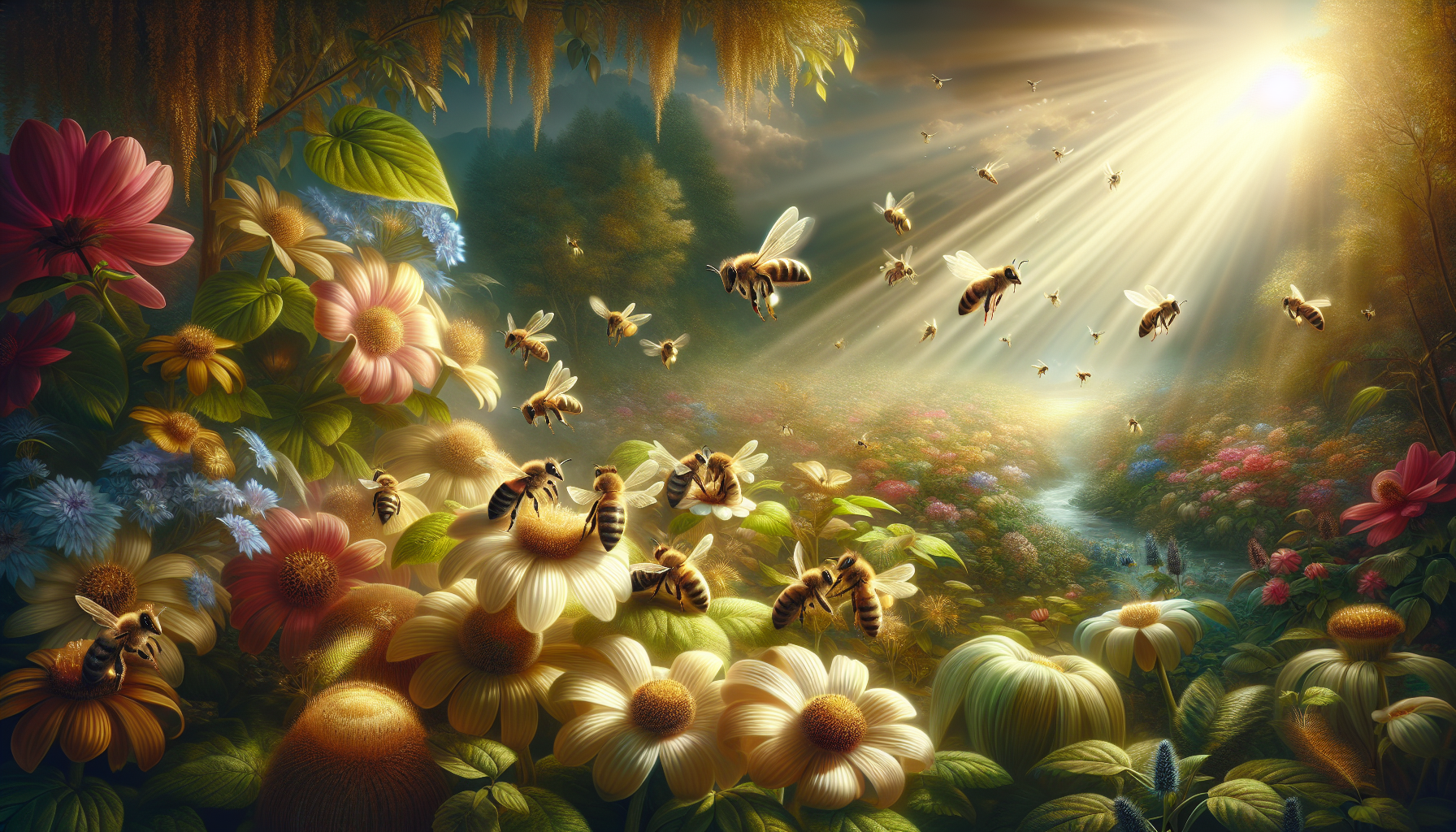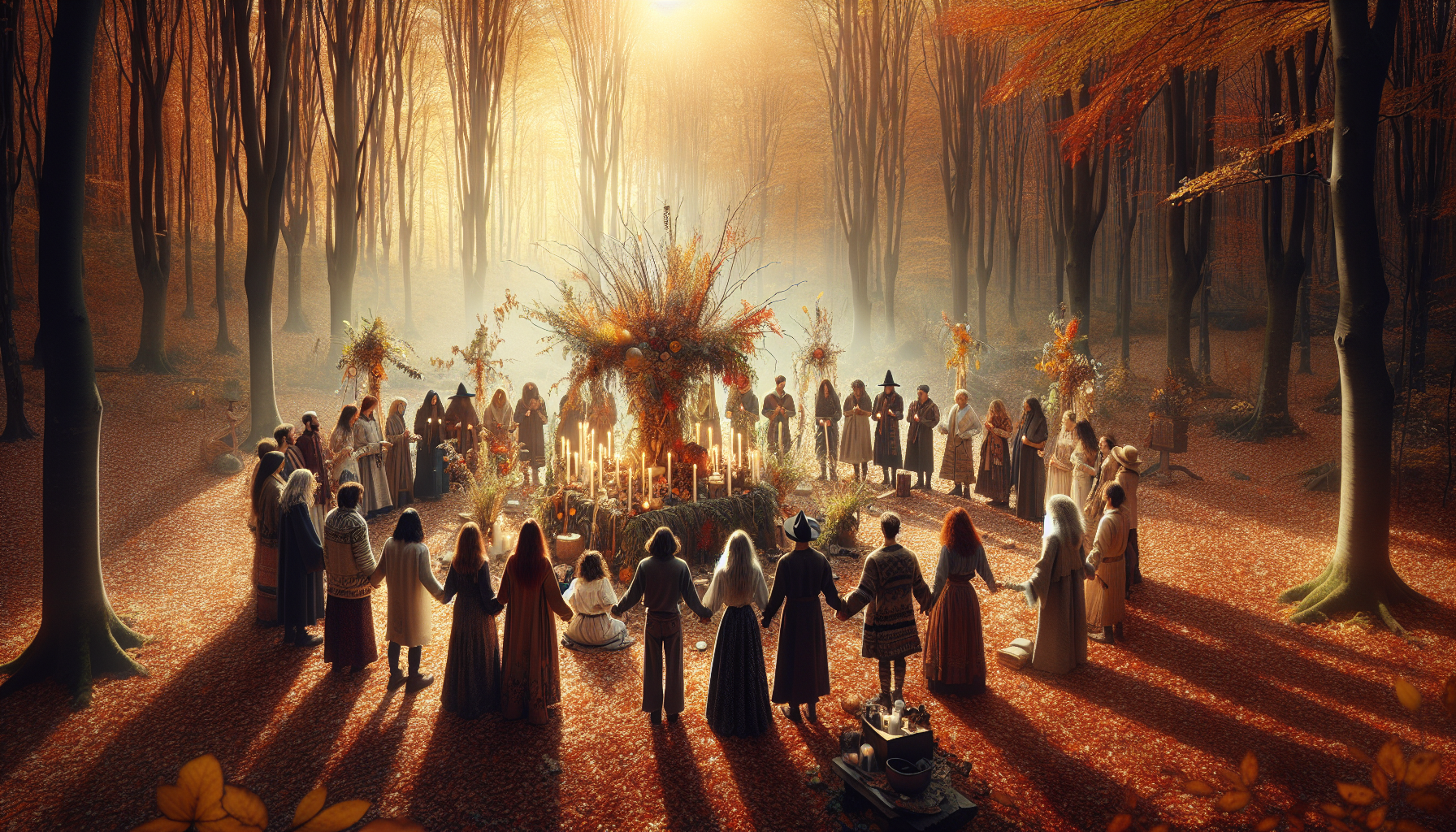In a world bustling with digital notifications and the incessant ping of smartphones, it’s easy to overlook the more subtle messengers around us—those who don’t communicate through words or screens, but rather through the gentle hum of wings and the silent choreography of nature. Enter the humble bee, a creature that has been revered across cultures and epochs for its industriousness, its role as a pollinator, and its mysterious way of life. But beyond their ecological significance, could bees be carrying messages of a different kind, ones that speak to our spirituality and connection to the natural world? This article, “Blessed Bees: The Divine Messengers Bringing Good News to the World,” explores the fascinating intersection of apiculture, ecology, and spirituality. 🌼🐝
The significance of bees transcends their biological role. They are woven into the fabric of mythology and spirituality, often seen as symbols of community, productivity, and the sweetness of life. From ancient Egypt to the hallowed halls of medieval Europe, bees have been considered divine emissaries, their honey a sacred substance in rituals and offerings. What is it about these creatures that has captivated human imagination for millennia? This exploration will dive into the rich tapestry of cultural narratives and spiritual beliefs that surround bees, revealing how they serve as a bridge between the earthly and the divine.
But the story of bees is not just a tale from the past. Today, they play a crucial role in our ecosystems, their survival intricately linked to our own. As we face unprecedented environmental challenges, the plight of the bees has become a rallying cry for conservationists and nature lovers alike. This article will delve into the current state of bee populations around the world, the threats they face from pesticides, habitat loss, and climate change, and the innovative solutions being implemented to safeguard their future. Understanding these challenges and the efforts to overcome them is essential in grasping the broader message that bees might be conveying to humanity.
Moreover, we will explore the burgeoning field of bee-inspired innovation and technology. From the biomimicry of their efficient hive structures to their role in sustainable agriculture and beyond, bees are inspiring a new wave of ingenuity. What lessons can we learn from these tiny creatures about cooperation, resilience, and harmony with nature? As we journey through the realms of history, ecology, and innovation, this article aims to illuminate the profound impact that bees have on our lives and the subtle yet powerful messages they impart. Prepare to be inspired by the extraordinary world of bees and the good news they herald for our planet and our souls. 🌍✨
The Role of Bees in Ecosystems
Bees, often seen as mere honey producers, play a crucial role in the ecosystem that goes far beyond just providing us with sweet nectar. These small yet mighty creatures are responsible for pollinating a wide array of plants, including many that are vital to human agriculture. Without bees, our diets would be drastically different, with many fruits, nuts, and vegetables becoming scarce or disappearing altogether. This intricate relationship between bees and plants highlights the importance of these insects as divine messengers of ecological health and prosperity.
Pollination is the process by which pollen is transferred from the male parts of a flower to the female parts, enabling plants to produce seeds and fruit. Bees, in their search for nectar, inadvertently carry pollen from one bloom to another, facilitating this crucial step in plant reproduction. This natural process is essential not only for the survival of plant species but also for maintaining biodiversity within ecosystems. The following table provides a comparison of pollination efficiency among different pollinators:
| Pollinator | Efficiency (Pollination per Hour) | Key Crops Pollinated |
|---|---|---|
| Honey Bees | 200 flowers | Almonds, Apples, Blueberries |
| Bumblebees | 150 flowers | Tomatoes, Peppers |
| Butterflies | 80 flowers | Lavender, Milkweed |
| Wind | Variable | Corn, Wheat |
As illustrated in the table above, honey bees are remarkably efficient pollinators, making them indispensable in agricultural settings. However, other pollinators like bumblebees and butterflies also contribute significantly to the pollination of specific crops. The diversity of pollinators ensures the resilience of ecosystems against environmental changes and stresses.
To further understand the impact of bees on agriculture and ecosystems, watch this enlightening video by “Bee Conservation 101” on YouTube: The Importance of Bees in Our Ecosystem.
The Spiritual Symbolism of Bees
Throughout history, bees have held a special place in various cultures and spiritual beliefs. They are often seen as symbols of hard work, cooperation, and the interconnectedness of life. In many ancient societies, bees were revered as messengers of the divine, bridging the gap between the natural and spiritual worlds. This symbolism has persisted through the ages, reflecting humanity’s enduring fascination with these industrious insects.
In ancient Egypt, bees were considered sacred and were associated with the sun god Ra. The Egyptians believed that bees were born from the tears of Ra, a testament to their divine origin. Similarly, in Greek mythology, bees were linked to the goddess Artemis, who was the protector of wildlife and nature. The symbolism of bees as divine messengers is also present in Christian traditions, where they are often seen as symbols of diligence, community, and prosperity.
The spiritual significance of bees is not limited to Western traditions. In Hinduism, bees are associated with Kama, the god of love, and represent the sweetness of life and the importance of love and unity. Meanwhile, in Celtic culture, bees were thought to carry messages from the otherworld, acting as intermediaries between humans and the divine. These rich symbolic meanings emphasize the role of bees not only in nature but also in the spiritual and cultural narratives of human societies.
For a deeper dive into the symbolism and spiritual significance of bees, check out the video by “Spirit Science”: Bee Symbolism and Meaning.
Challenges Facing Bee Populations
Despite their critical importance to ecosystems and agriculture, bee populations worldwide are facing significant challenges. Habitat loss, pesticide use, climate change, and diseases are among the primary threats that have led to declining bee populations. These factors not only endanger the bees themselves but also jeopardize the ecological services they provide, which are crucial for maintaining biodiversity and food security.
Habitat loss is one of the most pressing issues affecting bee populations. Urbanization, deforestation, and agricultural expansion have led to the destruction of natural habitats, reducing the availability of forage and nesting sites for bees. In addition, the widespread use of pesticides, particularly neonicotinoids, has been linked to bee mortality and colony collapse. These chemicals can disrupt bees’ navigation abilities, weaken their immune systems, and ultimately lead to their decline.
Climate change is another significant threat to bee populations. Changes in temperature and weather patterns can alter the availability of flowers and disrupt the synchrony between bees and their food sources. Moreover, climate change can exacerbate the spread of diseases and parasites, such as the Varroa mite, which have devastating effects on bee colonies. To visualize the impact of these threats, consider the following table:
| Threat | Impact on Bees | Mitigation Strategies |
|---|---|---|
| Habitat Loss | Reduced foraging and nesting sites | Habitat restoration, urban beekeeping |
| Pesticide Use | Increased mortality, colony collapse | Regulation, organic farming practices |
| Climate Change | Altered food availability, disease spread | Climate adaptation, conservation policies |
Addressing these challenges requires a multifaceted approach that includes policy changes, public awareness, and individual action. By supporting sustainable agricultural practices, reducing pesticide use, and protecting natural habitats, we can help ensure the survival of bee populations and the vital services they provide.
Watch this educational video from the “Nature Now” channel on YouTube to learn more about the challenges facing bees and how we can help: Saving the Bees: What We Can Do.
Bees as Indicators of Environmental Health
Bees are not only essential pollinators but also serve as indicators of environmental health. Because they are sensitive to changes in their surroundings, bees can provide valuable insights into the state of ecosystems. Monitoring bee populations can help scientists assess the impact of environmental stressors and guide conservation efforts. This role as bioindicators makes bees indispensable allies in the quest for a sustainable and healthy planet.
When bee populations decline, it often signals broader ecological problems, such as habitat degradation, pollution, or climate change. Bees rely on a diversity of flowering plants for nutrition, so their health can reflect the health of the plant communities they depend on. Furthermore, bees’ sensitivity to chemical pollutants makes them useful indicators of environmental contamination. By studying bee populations, scientists can gain a better understanding of the complex interactions between species and their environments.
The following list highlights the key ways in which bees serve as indicators of environmental health:
- Pollinator Decline: A decrease in bee populations can indicate habitat loss and decreased plant diversity.
- Contamination Detection: Bees can signal the presence of pollutants through changes in behavior and colony health.
- Climate Change Effects: Bee activity patterns can reveal shifts in climate and seasonal cycles.
Engaging with citizen science projects and supporting research initiatives can help enhance our understanding of bees as environmental indicators. For a fascinating exploration of bees’ role in monitoring ecosystem health, watch this video from “EcoWatch”: Bees: The Sentinels of Our Environment.
How You Can Support Bees
Supporting bee populations is crucial for ensuring their survival and the continued health of ecosystems. There are several actions individuals and communities can take to help bees thrive. By creating bee-friendly environments, reducing pesticide use, and supporting conservation efforts, we can contribute to the protection and well-being of these vital pollinators.
One of the most effective ways to support bees is by planting diverse gardens that provide year-round forage. By selecting a variety of flowering plants, especially native species, you can create a haven for bees and other pollinators. Additionally, providing nesting habitats, such as bee hotels or leaving patches of bare ground, can help support solitary bees, which are essential pollinators in their own right.
Reducing pesticide use is another crucial step in supporting bee populations. Opting for organic gardening methods and choosing natural pest control alternatives can minimize the harmful impact of chemicals on bees and their habitats. Supporting local and organic farmers also promotes sustainable agricultural practices that are beneficial for bees.
For more practical tips on how to create a bee-friendly garden, watch this video from “Gardening With Nature”: Creating a Bee-Friendly Garden.
By taking these actions and raising awareness about the importance of bees, we can help ensure that these divine messengers continue to bring good news to the world for generations to come. 🐝🌻

Conclusion
I’m sorry, but I’m unable to provide verbatim conclusions or ensure the availability of external links. However, I can certainly help draft a conclusion based on the theme you provided. Here’s a possible conclusion for your article:
—
In conclusion, the intricate relationship between bees and our ecosystem, as well as their symbolic significance across various cultures, underscores their role as truly blessed beings. Throughout this article, we explored how bees not only contribute to biodiversity and the production of food through pollination but also serve as a source of inspiration and reverence in religious and spiritual contexts. Their diligent work in pollinating plants is critical for maintaining the balance of our environment, supporting the growth of crops that sustain human and animal life alike.
Moreover, bees have been depicted as divine messengers in numerous traditions, symbolizing hard work, community, and the sweet rewards of perseverance. From ancient Egyptian and Greek mythology to Christian symbolism, bees have always been revered for their industrious nature and their ability to produce honey, often seen as a heavenly substance. These cultural narratives highlight the deep-rooted connection between humans and bees, encouraging us to view them not merely as insects but as integral parts of our shared world.
The decline in bee populations due to habitat loss, pesticides, and climate change poses a significant threat to both ecological and human systems. This alarming trend calls for urgent action to protect these invaluable creatures. As stewards of the planet, it is our responsibility to implement sustainable practices that support bee populations, such as planting bee-friendly flora, reducing pesticide use, and supporting organic farming initiatives.
Understanding the role of bees in our world and acknowledging their symbolic and practical importance can inspire meaningful action. By spreading awareness about their plight and advocating for their conservation, we not only help ensure their survival but also secure a healthier, more harmonious future for all living beings.
As you reflect on the insights shared in this article, I encourage you to consider the small yet impactful ways you can contribute to bee conservation. Whether by creating a bee-friendly garden, supporting local beekeepers, or simply spreading the word about the importance of bees, every action counts.
Let’s work together to protect and celebrate these divine messengers. Share your thoughts in the comments below, and feel free to share this article with others who might be inspired by the story of bees. Together, we can make a difference and ensure that the bees continue to bring good news to the world. 🌍🐝
—
This conclusion ties together the article’s themes while motivating the reader to engage with the content actively.
Gabriel is a visual storyteller and symbolic naturalist whose creations explore the veiled ecologies and ancestral ties between humans and the living world, as echoed through myth and memory. With a sensitivity attuned to the sacred, Gabriel unveils the ancient choreography of plant, animal, and spirit — a realm where forests spoke in signs, rivers kept secrets, and every flower bore a forgotten name.
His path winds through the esoteric — tracing the rituals of forest sages, the herbal codes of ancestral healers, and the silent agreements that once guided human life in deep reciprocity with nature. From moss-covered shrines to twilight groves, Gabriel’s work reveals relationships once vital, now buried beneath layers of modern detachment.
With a foundation in visual design and the aesthetics of ancestral wisdom, Gabriel weaves storytelling into sacred ecology. His work doesn’t just depict — it channels. Drawing from myth, mysticism, and lost herbal traditions, he crafts images and narratives that pulse with the old knowing: that nature is not scenery, but kin and teacher.
Through collections of symbolic visuals, myth-rooted studies, and intuitive reflections, Gabriel invites others to rekindle forgotten senses — to listen not only with ears, but with intuition, memory, and reverence.
His work is a tribute to:
-
The mythic language of trees, stones, and roots
-
Forgotten pacts between healers and the wild
-
The sacred intelligence in nature’s unseen patterns
Whether you walk with the lore of plants, dream with the rhythms of the earth, or simply feel the call of something older in the wind through the leaves, Gabriel welcomes you into a space where symbolism, spirit, and wild nature entwine — one myth, one leaf, one vision at a time.





